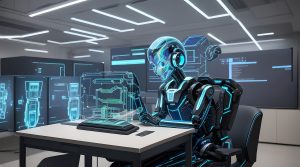” The Impact of Artificial Intelligence on Technology”

- Artificial Intelligence (AI) has become one of the most transformative forces in modern technology. It is no longer just a concept from science fiction — AI is now part of our everyday lives, powering everything from smartphones to healthcare systems. The impact of AI on technology has been revolutionary, changing how we work, communicate, and solve complex problems.
- AI refers to the simulation of human intelligence in machines that are programmed to think, learn, and make decisions. The core idea behind AI is to create systems that can analyze data, recognize patterns, and make predictions without explicit human instructions. This capability has opened the door to countless innovations across different technological fields.
- One of the most significant impacts of AI is in automation. In industries such as manufacturing, agriculture, and logistics, AI-driven robots and machines are performing tasks that were once done manually. This not only increases efficiency but also reduces human error. Automated production lines, for example, can operate continuously without fatigue, leading to higher productivity and consistency.
- In information technology, AI has transformed how data is managed and utilized. Machine learning algorithms can process massive amounts of data and extract meaningful insights within seconds. This has helped businesses improve decision-making, enhance customer experiences, and predict future trends. Cloud computing and AI together have made it possible for companies to analyze user behavior and provide personalized services, such as product recommendations on e-commerce platforms.
- Another major impact of AI is seen in communication technology. AI-powered language models and chatbots are revolutionizing how people interact with technology. Virtual assistants like Siri, Alexa, and Google Assistant have made it easier for users to perform tasks using natural language. AI also plays a crucial role in translation services, making global communication more accessible and efficient.

- In healthcare, AI has made remarkable contributions. Diagnostic systems using AI can detect diseases such as cancer and diabetes earlier than traditional methods. AI-powered medical devices assist doctors in surgery and treatment planning. Moreover, AI is helping in drug discovery, analyzing thousands of compounds to identify potential cures in a fraction of the usual time.
- The security sector has also benefited from AI. Advanced surveillance systems use facial recognition and behavioral analysis to identify potential threats. Cybersecurity systems powered by AI can detect and respond to cyberattacks faster than human analysts, ensuring better protection of sensitive data.
- However, despite its numerous advantages, AI also brings challenges. Job displacement due to automation, ethical concerns about data privacy, and the risk of bias in AI algorithms are issues that need careful consideration. Governments and organizations must develop policies to ensure that AI is used responsibly and fairly.
- In conclusion, the impact of artificial intelligence on technology is profound and far-reaching. It has revolutionized industries, improved human life, and opened new possibilities for innovation. As AI continues to evolve, it will shape the future of technology in ways we can only imagine — making our world smarter, faster, and more connected than ever before.
Title: The Impact of Artificial Intelligence on Technology